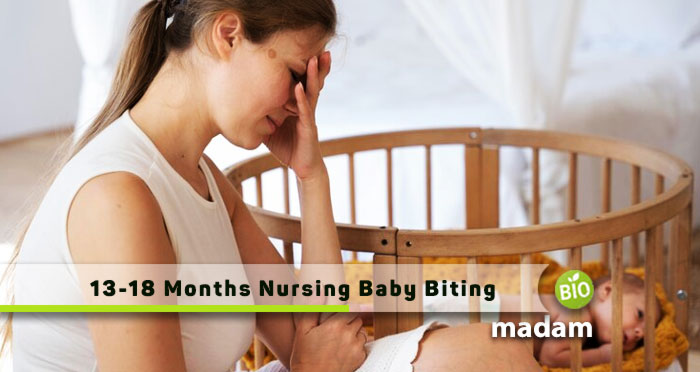Breastfeeding is a remarkable and essential bonding experience between a mother and her baby. However, as your little one grows and enters the 13-18 month age range, you might encounter some unexpected challenges. One of the most common hurdles during this phase is when your baby starts to bite while breastfeeding. In this guide, we’ll delve into the reasons behind this behavior and offer practical strategies to manage it effectively.
Why do Babies Bite During Breastfeeding?
Babies bite during breastfeeding for a variety of reasons attributed to their developmental stage. Firstly, teething discomfort is a prevailing factor during this period as new teeth emerge, subjecting their tender gums to unease. This discomfort could lead babies to seek relief by biting down, inadvertently creating pressure to alleviate their soreness. Secondly, fueled by an insatiable curiosity about the world they’re discovering, babies at this age utilize their mouths as a means of exploration. Biting becomes a tool to comprehend their surroundings, often extending to even the most familiar entities, like your breasts. Lastly, babies are astute learners, and they swiftly grasp the cause-and-effect dynamics of their actions.
In essence, these factors intertwine to create a complex tapestry of reasons why babies resort to biting during breastfeeding, each woven with their burgeoning understanding of themselves and the world they’re embracing.
Tailoring Approaches for Different Age Brackets
As you navigate the challenge of nipple biting during breastfeeding, adapting your strategies based on their age can lead to more effective results. Here’s a closer look at how you can tailor your approach for each age bracket:
13-Month-Old Baby: Focus On Soothing And Teething Relief
During the 13th month, your baby might be dealing with emerging teeth and the discomfort that comes with it. To address nipple biting effectively, it’s important to create a calm and soothing environment for breastfeeding. Dimming the lights and minimizing noise can help your baby focus on the feeding process without getting overly distracted. Moreover, offering teething toys before nursing sessions can help alleviate the discomfort your baby may be experiencing from teething. By engaging their gums with safe and clean teething toys, you can reduce the urge to bite during breastfeeding.
14-Month-Old Baby: Experiment with Positions and Boundaries
As your baby enters the 14th month, they might still be exploring their boundaries and testing new behaviors. To discourage biting during breastfeeding, consider experimenting with different breastfeeding positions. Positions that allow you to maintain better control over your baby’s head and mouth can make it more difficult for them to bite while nursing. Additionally, it’s essential to establish gentle boundaries. Communicate firmly but gently that biting is not acceptable behavior. Using a soft and reassuring tone when addressing the issue can help your baby understand and learn from your response.

15-Month-Old Baby: Engage And Distract
At 15 months, your baby’s curiosity is growing, and they may easily become distracted during breastfeeding. To prevent biting and maintain a positive feeding experience, incorporating distractions can be beneficial. Try playing soft and soothing music in the background while nursing. Alternatively, you can provide a nursing necklace – a safe and engaging accessory for your baby to explore during nursing sessions. By keeping them engaged and focused on feeding, you can reduce the likelihood of them resorting to biting behavior.
16-Month-Old Baby: Introduce Brief Breaks
By the 16th month, your baby might be developing a stronger understanding of cause and effect. You can use this developmental phase to curb biting behavior during breastfeeding. If your baby bites, consider offering a brief break from nursing. Gently and calmly remove them from the breast for a short period. This action helps them understand that biting leads to a temporary pause in feeding. The cause-and-effect principle can be a valuable tool in teaching your baby about appropriate behavior during breastfeeding.
17-Month-Old Baby: Consistency In Responses
As your baby reaches 17 months of age, they are becoming more receptive to consistent behaviors and consequences. To address nipple biting during breastfeeding, practice consistent responses. When your baby bites, maintain your calm demeanor and consistently say “no biting.” Pausing the feeding for a short while after a bite helps your baby understand that this behavior is not acceptable. Over time, this consistency can help them learn the connection between their actions and the resulting consequences.
18-Month-Old Baby: Transitioning To New Phases
As your baby approaches 18 months, their nutritional needs and developmental milestones are evolving. This can be a suitable time to begin gently introducing the concept of weaning. As you notice your child’s increased interest in solid foods and other drinks, you can initiate discussions about transitioning from breastfeeding. Gradually introducing them to new nourishing options and adjusting their feeding routines can be an important step in preparing for the weaning process. While addressing nipple biting remains relevant, this age also marks the beginning of new phases in your baby’s growth and development.
Strategies to Address Nipple Biting
Dealing with nipple biting requires patience and a gentle approach:
- Recognize the Signs: Watch for signs beyond changes in latch or sucking patterns that might indicate your baby is about to bite. These signs could include tension in their jaw or a shift in their body language.
- Stay Calm: In addition to avoiding dramatic reactions, maintain a calm demeanor throughout the nursing session. Babies can pick up on your emotions, so staying relaxed can help prevent them from becoming anxious.
- Gentle Correction: If your baby bites, employ gentle correction techniques. Instead of forcefully pulling away, gently insert your pinky finger into the corner of their mouth to break their latch. This action not only prevents biting but also avoids causing any discomfort.
- Use a Nursing Necklace: Consider using a nursing necklace made of safe materials that your baby can hold or play with during feeding. This can keep their hands occupied and reduce the likelihood of them using biting as a way to explore.
- Offer a Teething Aid: Have a chilled teething ring or a clean, damp washcloth nearby during feedings. If your baby starts to bite, you can quickly offer the teething aid as an alternative to your nipple.
- Create a Distraction-Free Environment: Minimize distractions in your breastfeeding environment. Turn off the television, put away your phone, and choose a calm and quiet spot for feeding. Fewer distractions can help your baby focus on feeding rather than exploring biting.

- Practice Soft Pressure: If you sense your baby’s jaw tensing, gently press down on their chin with your thumb. This reflex can prompt them to open their mouth wider, making biting less likely.
- Offer a Break: If biting becomes persistent, offer a brief break from breastfeeding. Gently remove your baby from the breast and give them a few moments before resuming. This pause can help them understand the connection between biting and a pause in feeding.
Conclusion
Navigating the phase of nipple biting during breastfeeding between 13 and 18 months old requires patience, understanding, and adaptability. By recognizing the developmental factors at play and tailoring your approach to your baby’s age, you can maintain a positive breastfeeding experience while gently guiding your child through this phase. Remember, seeking support and advice when needed will empower you to provide the best care for your growing baby.

People call me Domonique Smith in Ross! I was always fond of helping people, so opted an MBBS degree to pursue my passion as my career. My major interests fall in dealing with pregnant ladies and helping them in the best of my wills for their comfort. I am further planning to choose Gynecology as my major, so wish me luck!

